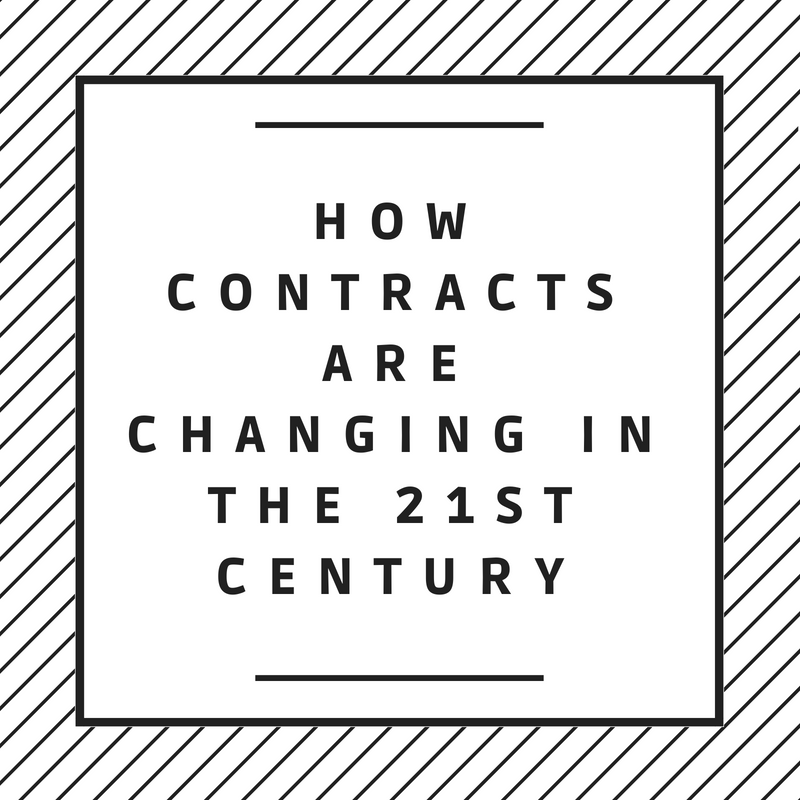Some of the oldest written documents are not love letters or laws – they’re contracts. Indeed, Sumerian cuneiform, though eventually used to write complex laws and literature, was largely employed in contract management to ensure that buyers and sellers were appropriately reimbursed.

Contracts form the backbone of human civilization, and they have done so for millennia. Yet, in the thousands of years between the first contracts and those of today, much has changed. No longer are contracts pressed into clay tablets; they are stored in complex digital systems that are smarter and more efficient than human workers could ever be. The 21st century promises major alterations to how contracts look and function; here are a few advanced contract solutions that already exist – and a few that will likely emerge in the coming decades.
eSignatures
Admittedly, eSignatures are not a 21st-century invention; computers were first used to ratify documents in the 1980s, and some historians argue that signatures sent over morse code in the 1860s should count as the first eSignings. Still, electronic signatures are relatively new, technologically advanced additions to the contract process.
By using an eSignature Software, businesses benefit in a number of ways. First, they speed up the contract process by avoiding the need to corral different parties in one physical space at the same time. Additionally, eSignatures are more secure because they require identity verification before signings can occur. eSignatures often cost less by reducing the need for multiple hardcopies, and they integrate well with other document software services, like those below.
Document Generation
The first step of any contract process is the negotiation, followed closely by document generation. Unfortunately, too many businesses make major mistakes during these phases, resulting in less-than-optimal agreements and a significant waste of time and resources. Fortunately, this can be overcome with document generation tools, which both speed up the contract generation process and improve accuracy and authority of agreements.
Document generation tools take various forms, but among the most popular is software that takes the form of an interview. By asking strategic questions of both parties, the tool can produce a document that addresses everyone’s needs while remaining compliant and exact.
Data Extraction
As the role of Big Data expands, businesses are looking in every nook and cranny for valuable sources of information. As it turns out, contracts contain multitudes of valuable data, but identifying that data – let alone applying it to important decisions – is a time-consuming process for a human worker.
Thus, contract data extraction software is slowly becoming indispensable for businesses that want to leverage the data contained in their written agreements. Usually, in conjunction with other document services, data extraction tools use artificial intelligence to scan and capture information. More advanced tools also map the data, which further facilitates the data’s use by businesses.
Lifecycle Management
It doesn’t matter whether a business devotes a file cabinet to storing contracts or an entire office building floor – whether a business devotes a small team to organization or throws the responsibility to an already overtaxed administrator – eventually, those contracts will fall into disarray. Manual contract management is expensive, inefficient and ultimately unsuccessful which is why most companies nowadays use digital contract lifecycle management tool.
This software, like others within this guide, store contracts in a digital space and analyzes them for important data. Then, the software facilitates the negotiation, approval and execution processes and provides alerts for inefficiencies, expiration dates and similar information that is hard to find and harder to remember. Essentially, lifecycle management tools are one-stop-shop platforms that make contracts easier from beginning to end.
Smart Contracts
Currently, there are dozens of contract software applications, but in the not-too-distant future, there could be one: smart contracts. Smart contracts will help businesses build, enact and enforce contracts in one fell swoop thanks to the progressive blockchain technology that forms their foundations. Most tech experts agree that blockchain is the next major evolution of technology, and it stands to reason that contracts will advance sooner rather than later.
It’s difficult to say where the future will take humankind. Will we relocate to the Moon or Mars? Will everyone have personal spaceships? Will the robots take over? Regardless of what the future holds, one thing is certain: Contracts will remain. Technologies like blockchain will swiftly update dozens of processes, including contracts, transforming how they function. Until then, businesses can rely on intelligent systems to optimize their contracts, making them more efficient and productive than the Sumerians could have believed.
You can also stay updated by subscribing to iTechCode.